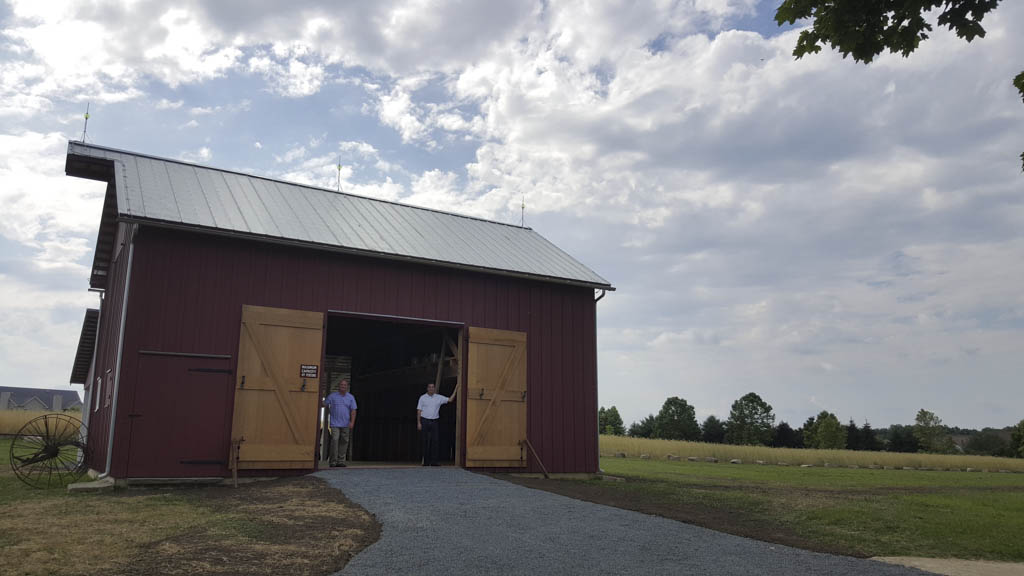By KATHY CHANG
Staff Writer
MONROE — The famous quote, “If you build it, he will come,” from the 1989 film “Field of Dreams,” resonated as Monroe dedicated the 19th-century historic Prospect Plains Road one-room schoolhouse.
“It’s like you can almost see [actor] Kevin Costner,” Township Historian John Katerba said with a smile on June 18, pointing to the open space where the schoolhouse now sits on the 40-plus-acre Dey Farm Historic site located at 401 Federal Road.
As lifelong residents, Katerba and Ward 2 Councilman Blaise Dipierro said they may be a bit biased calling the site the best spot in Monroe, a town that spans 42.2 square miles.
“Our biggest problem is to get people here,” Katerba said. “The site is open from dawn to dusk.”
The schoolhouse and barn are open for tours on the first Sunday of every month from 1-4 p.m.
On June 18, the Monroe Township Historical Preservation Commission held a dedication of the schoolhouse, which is named after former longtime Councilman Henry “Hank” L. Miller. The structure is the only remaining one-room schoolhouse of 16 that served as the local educational facilities for grades kindergarten to 12 until 1936.
Katerba said many of the schoolhouses were sold.
The one-room school buildings were all built between 1838 and 1850, officials said. Those schools were shut down when the Barclay Brook School and the Applegarth School were built in 1936 as part of the New Deal’s Works Progress Administration.
The last remaining schoolhouse then became the old municipal building on Prospect Plains Road until the current town hall opened in 1982. It was then periodically used by the local recreation department, as well as for a food pantry until it was taken down and preserved.
Dipierro said he has one of the rare photographs inside the schoolhouse when it was used as the municipal building when he was a young child in 1969 with his father Michael J. Dipierro, who previously served as a Ward 2 councilman and mayor, and his siblings.
The photo in a local newspaper article is of the elder Dipierro being sworn in as mayor with his children holding the Bible.
Katerba said the schoolhouse, which is refurbished to the way it looked in 1850 with its original gray and chocolate brown trim complete with its unique bell tower, is appropriately named after Miller, who was present at the dedication.
“[Miller] was instrumental in keeping the area open space,” he said. “It was the Dey Farm for 100 years before the area was sold to a developer.”
However, with the likes of Miller and former Mayor Richard Pucci and others, the township was able to preserve the 40-plus-acre of land. The developer, Renaissance Properties of nearby Southfield Estates, donated the tract in 2001.
Monroe received a $1 million grant about five to six years ago from Middlesex County to undertake the historic preservation, including repairing the barn on the site, which dates back to the 1800s, and to reconstruct the Prospect Plains one-room schoolhouse from the 1850s.
Katerba said it took years to get to the point of the dedication. He said they were in the midst of designs and bids when Hurricane Irene in 2011 and superstorm Sandy in 2012 created setbacks.
“Half the roof of the barn had blown off and we put tarps around it and did the best we could. … We were just happy it was still standing,” he said.
The site now serves as the township museum with several historic buildings: the Dey Farmhouse and Barn, the schoolhouse as well as England House, which dates to the 1810s.
Katerba said with the funds, the roof of the England House was replaced and the gutters were handmade to look identical to how buildings were made back in the 1800s.
The museum is packed with historic artifacts ranging from Native American arrowheads to World War II-era news clippings and 1940s television sets, all donated by local residents.
Katerba noted that with the help of art students at Monroe Township High School, the schoolhouse has hand-drawn signs that read “Prospect Plains School No. 2 — 1868” and “Henry L. Miller One-Room School House” that will be hung outside of the school house.
Even though the township has grown into a more suburban-rural community, it has 1,290 acres of preserved farmland.
During the spring and summer, the township’s Historic Preservation Commission holds guided tours of the Dey Farmhouse, showing off the many artifacts found in Monroe, including old school desks and supplies, military uniforms, dairy bottles and more.
Upkeep on the farm is done primarily by the township’s Department of Public Works and volunteers from the Historic Preservation Commission, but over the years many local volunteers and scouts have done work at the farmhouse.
“We have three or four Eagle Scout projects done on the property,” Katerba said.
The commission also holds annual events at the farm, including a vintage baseball game in September, with 19th-century rules, between the Flemington Neshanocks and the Philadelphia Athletics, and the Civil War Living History Day, when residents got a glimpse of what life was like for soldiers and civilians during the 1860s war.
Contact Kathy Chang at [email protected].

